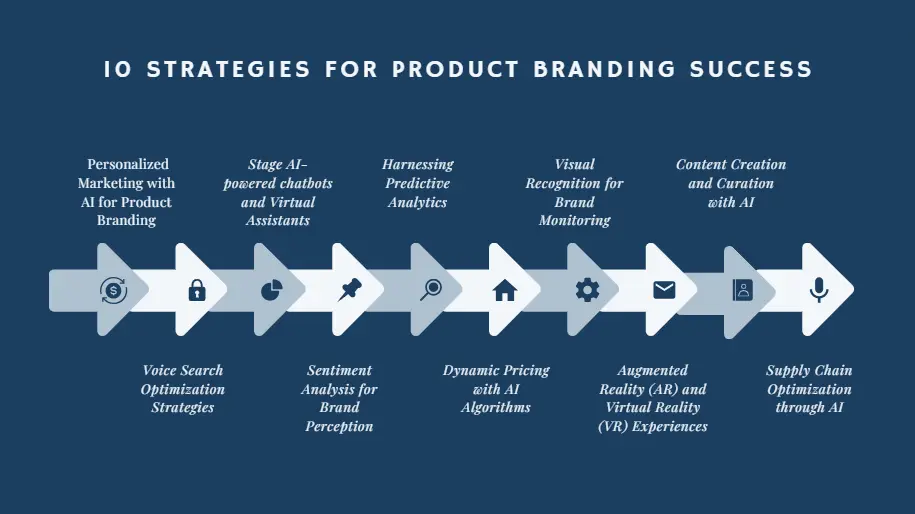Table of Contents
In the dynamic realm of business and marketing, Artificial Intelligence (AI) stands out as a transformative force, serving as a potent ally in sculpting and elevating product branding strategies. This article takes a comprehensive dive into ten cutting-edge AI strategies poised to invigorate your product branding initiatives, promising unparalleled success in today’s fiercely competitive market.
Amidst the fast-paced evolution of business landscapes, AI emerges as a linchpin for companies seeking to establish a distinctive brand identity. By embracing these ten dynamic AI strategies, businesses can navigate the intricacies of product branding with finesse, positioning themselves at the forefront of innovation and ensuring their resonance in the highly competitive market.

1. Personalized Marketing with AI for Product Branding
Utilizing AI algorithms to scrutinize customer data provides valuable insights into preferences and behaviors. This data-driven approach empowers businesses to craft personalized marketing strategies, tailoring content and recommendations to the unique preferences of individual consumers. The outcome is a heightened level of engagement and a more relevant brand experience, fostering a sense of connection and loyalty among customers.
Spotify, a trailblazer in product branding, strategically utilizes AI to enhance the user experience through personalized music recommendations. Leveraging sophisticated algorithms, the platform delves into each user’s unique listening history and preferences, meticulously curating personalized playlists and offering tailored suggestions for new music.
This commitment to individualized content not only fosters a deeper connection between users and the platform but also solidifies Spotify‘s brand as a pioneer in delivering a personalized and engaging music streaming experience. Through the seamless integration of AI in its product branding strategy, Spotify continues to set the standard for innovative and user-centric music services in the competitive digital landscape.
2. AI-powered chatbots and Virtual Assistants
The incorporation of AI-powered chatbots and virtual assistants marks a transformative shift in customer support within the realm of product branding. These sophisticated systems deliver instantaneous assistance, adeptly addressing inquiries and seamlessly guiding users through interactions. The result is not merely an elevated user experience but also a bolstering of a positive brand image, characterized by the provision of immediate and efficient support.
Apple strategically incorporates its virtual assistant, Siri, as a central element in its product branding. Seamlessly integrated into all Apple devices, Siri functions as an intuitive and voice-activated assistant, embodying the brand’s commitment to user-friendly innovation.
With a focus on enhancing the user experience, Siri provides a range of functionalities and instant access to information, aligning perfectly with Apple’s emphasis on cutting-edge technology. The integration of Siri across Apple’s product lineup reinforces the brand’s dedication to delivering a cohesive and technologically advanced ecosystem, ultimately contributing to a distinctive and positive product branding identity.
3. Harnessing Predictive Analytics
Harnessing the power of AI’s predictive analytics is a game-changer for product branding. This technology empowers brands to anticipate future trends and understand consumer behaviors through a thorough analysis of historical data. By leveraging these insights, businesses can make informed decisions, gain a competitive edge, and ensure their products align seamlessly with the ever-evolving demands of the market. This strategic use of AI not only propels brands forward but also establishes a dynamic connection between their offerings and the constantly shifting landscape of consumer preferences.
Uber strategically employs predictive analytics as a cornerstone of its product branding approach. By leveraging this advanced technology, the company effectively estimates ride fares, anticipates rider demand in targeted regions, and optimizes the dispatch of drivers. This streamlined operational efficiency enhances the overall service quality, contributing to a positive and reliable image for the Uber brand. The integration of predictive analytics aligns with Uber’s commitment to providing a seamless and efficient transportation experience, reinforcing its position as a leader in the ride-sharing industry.

4. Visual Recognition for Brand Monitoring
In the realm of product branding, AI-powered visual recognition systems play a pivotal role by meticulously scanning social media platforms for brand mentions and sentiments. This real-time monitoring capability empowers brands to proactively address customer feedback, adeptly manage their reputation, and strategically leverage positive mentions. By staying attuned to the dynamic social landscape, brands can not only enhance their responsiveness but also craft a more nuanced and positive narrative around their products.
Talkwalker is a leading provider in the field of social media analytics and monitoring services. Their expertise lies in utilizing sophisticated image recognition technology to meticulously track and analyze visual content associated with a brand across various social media platforms. This means that Talkwalker goes beyond simply monitoring text-based mentions; it actively scans images and videos to provide comprehensive insights into how a brand is visually represented online.
This level of analysis enables businesses to gain a deeper understanding of their online presence, identify trends, measure the impact of visual content, and make informed decisions to enhance their brand strategy. In essence, Talkwalker’s capabilities in image recognition contribute significantly to a comprehensive and insightful approach to social media brand monitoring.
5. Content Creation and Curation with AI
Leveraging AI-driven content creation for product branding transforms the content creation landscape, providing a seamless and efficient approach. By automating tasks such as generating social media posts and crafting product descriptions, AI guarantees consistency and substantial time savings. Technology plays a pivotal role in creating content that is not only compelling but also highly relevant, effectively resonating with the specific needs and preferences of the target audience. This automated content creation process elevates the overall brand image, ensuring a cohesive and engaging narrative across various marketing channels.
Content can include images, videos, blogs, eBooks, podcasts, etc. Video plays a vital role in branding, and to create the best AI video content for branding a product, an AI video generator is crucial.
Acrolinx leverages AI to meticulously assess and enhance the content, ensuring a harmonized and compelling brand narrative. This sophisticated tool aids organizations in upholding a consistent and captivating brand voice across diverse communication channels, contributing to a seamless and impactful product branding strategy.
6. Voice Search Optimization Strategies
In the era of the rising popularity of voice-activated devices, the optimization of content for voice search is paramount for effective product branding. Artificial Intelligence (AI) plays a pivotal role in this landscape, deciphering natural language queries and empowering brands to customize their content in alignment with user expectations. This proactive approach not only ensures visibility but also cultivates a distinct brand presence in the realm of voice searches, contributing to a comprehensive and engaging product branding strategy.
Microsoft prioritizes Product Branding through strategic integration of voice search capabilities. This enhancement is evident in products like Cortana, the virtual assistant seamlessly woven into the Windows ecosystem. Users experience the brand’s commitment to innovation as they employ voice commands to effortlessly execute tasks and access information on various Windows devices.
This integration not only showcases Microsoft’s technological prowess but also ensures a user-friendly and distinctive product branding experience, reinforcing the company’s position as a leader in the tech industry.

7. Sentiment Analysis for Brand Perception
AI-driven sentiment analysis tools play a pivotal role in product branding strategies by meticulously scrutinizing online conversations and reviews. This enables brands to gain valuable insights into customer sentiment, offering a nuanced understanding of how their products are perceived.
Armed with this information, brands can pinpoint areas for improvement, leverage positive feedback to reinforce their strengths, and swiftly address any negative sentiment. In doing so, companies can proactively shape their brand image, enhancing customer satisfaction and solidifying their position in the market.
Samsung employs sentiment analysis to gather insights from customer reviews and social media discussions. This helps them understand user preferences and make informed decisions about product development and marketing.
8. Dynamic Pricing with AI Algorithms
Utilizing advanced AI capabilities, companies strategically leverage market insights, competitor pricing data, and demand trends to dynamically optimize the pricing of their products. By implementing dynamic pricing strategies, businesses can adeptly navigate the complexities of the market, ensuring their brand stays competitive and attains maximum revenue.
This data-driven approach allows for real-time adjustments, enabling companies to align their pricing with market dynamics and consumer expectations, ultimately contributing to a strong and competitive product branding presence.
Airbnb employs a dynamic pricing strategy for its product branding, adapting accommodation costs in real time. The platform considers variables such as location, seasonality, and demand, enabling hosts to fine-tune their pricing strategies effectively, ultimately contributing to enhanced revenue generation. This approach aligns with Airbnb‘s commitment to providing value and flexibility, showcasing how product branding can be strengthened through intelligent and responsive pricing models.
9. Augmented Reality (AR) and Virtual Reality (VR) Experiences
AI plays a pivotal role in elevating the product branding experience by driving immersive Augmented Reality (AR) and Virtual Reality (VR) interactions. These technologies enable customers to virtually experience and test products before making a purchase, fostering a sense of confidence in the brand.
This innovative approach distinguishes the brand, creating memorable and interactive encounters that go beyond traditional marketing methods. Through the integration of AI, product branding becomes a dynamic and engaging process that resonates with consumers and sets the brand apart in the competitive market.
L’Oreal has integrated AR into its makeup brands, allowing users to try virtual makeup through mobile apps. This AR experience helps customers make informed decisions about beauty products.

10. Supply Chain Optimization through AI
Leveraging AI for supply chain optimization proves instrumental in guaranteeing the punctual and streamlined delivery of products. This operational efficiency not only bolsters the brand’s reliability but also plays a pivotal role in shaping a positive customer experience. The seamless and timely fulfillment of orders, made possible through AI-driven supply chain processes, becomes a cornerstone in reinforcing the brand’s reputation and fostering customer satisfaction, ultimately contributing to the overall success of product branding initiatives.
Walmart has been investing in AI to optimize its supply chain. The company uses predictive analytics and machine learning to improve inventory management and ensure products are available to customers when needed.
The culmination of AI Strategies for Product Branding Success
In today’s rapidly evolving business landscape, the integration of AI is proving to be a transformative force for product branding. The adoption of ten dynamic strategies empowers brands to transcend traditional marketing approaches and embrace a new era of competitiveness. By strategically incorporating AI, brands can forge a distinctive and positive identity in the minds of consumers.
This modern approach not only ensures competitiveness but also leaves a lasting impression, contributing to a favorable perception of the brand. As consumer expectations continue to shift in the digital age, AI has become an indispensable tool for navigating the complexities of product branding successfully.
Embracing AI in product branding is more than a trend; it’s a necessity. The digital landscape demands innovative strategies, and AI provides the means to meet and exceed these evolving expectations. As brands leverage AI’s full potential, they position themselves for unparalleled success and recognition in the market.
The dynamic interplay between AI and product branding creates a synergy that goes beyond mere competitiveness—it establishes a brand’s resilience and relevance in a landscape where adaptability and innovation are paramount. In this era of technological advancement, the strategic integration of AI ensures that your brand not only survives but thrives, paving the way for sustained success and prominence in the market.





